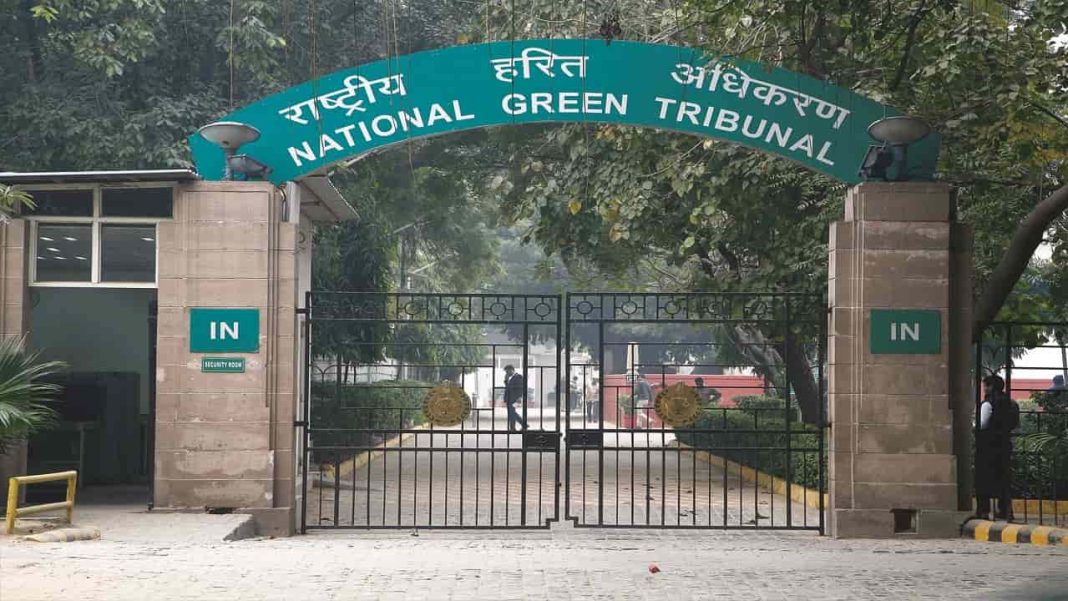The National Green Tribunal (NGT) recently directed the Supreme Court-appointed monitoring committee, the Central Pollution Control Board (CPCB) and the Delhi Pollution Control Committee (DPCC) to look into illegal dyeing units operating in the Capital. The Tribunal also directed CPCB and DPCC to jointly file an action-taken report on the compliance status in respect of the units named in an application filed by Varun Gulati.
The application claimed that dyeing factories were operating without permission in Bindapur, Matiala, Ranhola, Khyala, Meethapur, Badarpur, Mukundpur and Kirar in the Capital. It named 21 such “illegal” units and also alleged that there are over 500 such units operating in these areas and discharging effluents into the Najafgarh drain or the Swaroop Nagar drain, which then flow into and meet the Yamuna river. He also alleged that the factories were illegally extracting groundwater and there was no common treatment plant for treating the effluents. According to the application, Gulati had approached the DPCC, which had forwarded the complaint to the Municipal Corporation of Delhi, but no action was taken.
The NGT bench of Chairperson Justice AK Goel said the monitoring committee appointed by the Supreme Court must look into the matter in coordination with other authorities concerned, including CPCB and DPCC. The bench, also comprising Judicial Member Justice Sudhir Agarwal and Expert Member Dr A Senthil Vel, said that the action-taken report should mention the consent status and compliance status with reference to disposal of effluents into the drain location of these units in the non-conforming areas and proposed remedial actions within three months. The matter was posted for further hearing on October 4.
“Testing of water quality in the area shows high pH, turbidity, bad odour, total dissolved solids, total suspended solids, biochemical oxygen demand, chemical oxygen demand, chloride, nitrate, sulphuric acid, heavy metals and low dissolved oxygen. The effluents are highly toxic, carcinogenic and hazardous to the health of the people residing nearby,” the application said.
It is pertinent to mention here that several actions have been taken against dyeing units by NGT in the past. The NGT had even fined DPCC Rs 5 lakh for allowing illegal dyeing units to operate on February 28, 2019. The NGT order came while hearing a petition against alleged illegal activities of jeans and dyeing units operational in Bhim Colony, Aali Vihar and Sarita Vihar which were causing damage to the environment. The CPCB later submitted a report on January 11, 2019, stating that the area was being used for residential purposes. It was also claimed that the dyeing units were operating without a NOC, consent or corporation licenses. A bench headed by AK Goel, NGT chairperson, said that a joint committee, comprising representatives of CPCB, DPCC and SDM, southeast, will be formed to work out the facts and submit an action-taken report.
In June 2021, the NGT had slammed the Himachal Pradesh State Pollution Control Board for “inaction” against industrial units polluting water bodies in the state. “Merely keeping an eye on units discharging more than 200 kilo-litres per day (KLD) effluents is not enough. Violations by those discharging less than 200 KLD effluents are no less serious,” it had observed.
Auro Textiles, Auro Textiles unit-II, Auro Dyeing and Winsome Textile were installing an advanced system for treating fixed dissolved solids (FDS), a category IV effluent comprising concentrated dyes. The pipeline carrying these effluents was found choked. The NGT directed the state board to take remedial action to enforce environment laws.
In 2019, following complaints against six textile dyeing units located in Sector 49 and 50 of Barola in Uttar Pradesh, the state pollution control board had sealed their premises. It was alleged that the textile dyeing units were operating their factories without the required pollution control licenses. The state pollution control board action was compounded by the district administration. The administration was backed by the district magistrate who ordered the disconnection of electricity supply to the six units. The district officials said that the main allegation against these units was that they were releasing polluted water without treating the effluents. A functional effluent treatment plant should be present at the site and should pass the eligibility criteria of the state control board before receiving the requisite license, the officials said.
The Uttar Pradesh Pollution Control Board (UPPCB) had clarified that the dyeing units were required to set up an effluent treatment plant for treating acidic chemicals that are the by-product of colour and other raw materials used in dyeing. It is mandatory for all dyeing units to provide proof that they have set up the plant. The UPPCB officials also contended that these six units were set up in a residential area, and as a result, violated the norms.
In 2004, the Supreme Court directed the shifting or closure of industrial activities that violated the master plan of Delhi and also laid down the monitoring mechanism. For stopping illegal industrial activities, the Court had formed a monitoring committee, comprising Delhi’s chief secretary, police commissioner, municipal commissioner, and vice-chairman, Delhi Development Authority.
—By Abhilash Kumar Singh and India Legal Bureau


